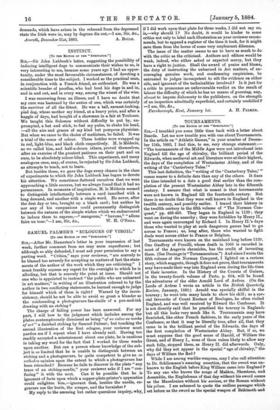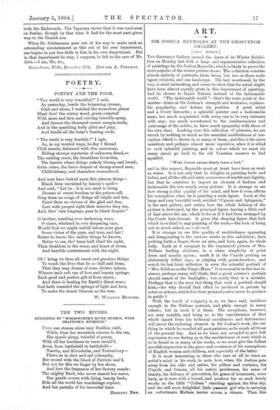TOURNAMENTS.
[TO THE EDITOR OF TEE " SPECTATOR." J
SIR,—I troubled you some little time back with a letter about Beards. Let me now trouble you with one about Tournaments.. In the article on " Athletic Games," in your number of Decem- ber 15th, 1883, I find this, to me, very strange statement :— "The tournaments of the Middle Ages were not introduced into England till the age of chivalry, the brilliant period of the Edwards, when mediaeval art and literature were at their highest, the days of the completion of Westminster Abbey, and of the writing of the Canterbury Tales."
This last definition, the "writing of the Canterbury Tales,' comes nearer to a definite date than any of the others. It fixes the time intended to a date a good deal earlier than the com- pletion of the present Westminster Abbey late in the fifteenth century. I assume that what is meant is that tournaments. were not known in England till the fourteenth century. But there is no doubt that they were well known in England in the twelfth century, and possibly earlier. I traced their history in the twelfth century in the fifth volume of "The Norman Con- quest," pp. 488.489. They began in England in 1139 ; they went on during the anarchy ; they were forbidden by Henry IL, and were again encouraged by Richard I. In Henry IL's days- those who wanted to play at such dangerous games had to go, across to France; as, long after, those who wanted to fight- duels went across either to France or Belgium.
Tournaments were known on the mainland long before 1139. One Geoffrey of Preuilli, whose death in 1066 is recorded in most of the Angevin chronicles, has the credit of inventing, them. (See D ucange in "Torneamentum.") And since I wrote the fifth volume of the Norman Conquest, I lighted on a curious. story, which suggests, though it does not prove, that tournaments may have made their way into England even during the life-time of their inventor. In the History of the Counts of Gaines,. in the twenty-fourth volume of Pertz, p. 604, will be found the adventures of the elder Arnold Lord of Ardres. (On the Lords of Ardres I wrote an article in the British Quarterly Review, January, 1880.) Arnold was specially skilful in the tourney ; he went into many lands to show his skill ; as a spe- cial favourite of Count Eastace of Boulogne, he often visited England, and was well received by Edward the Confessor. It is not directly said that he practised the tourney in England/. but all this looks very much like it. Tournaments may have flourished, like other French fashions, in the early years of the Confessor, so that it may be literally true, after all, that they came in in the brilliant period of the Edwards, the days of the first completion of Westminster Abbey. But, if so, we must suppose that the good sense of Harold, of William the Great, and of Henry I., none of them rulers likely to allow any such folly, stopped them, as Henry II. did afterwards. Only, why did they not appear in the special " age of chivalry," the- days of William the Red P While I am among warlike weapons, may I also call attention to Dr. Schliemann's amazing assertion, that the sword was un- known to the English before King William came into England To any one who knows the songs of Mahlon, Shezatene, and Assandtin, the Englishman of that day without his sword seems as the Macedonian without his &trim, or the Roman without his pilum. I am ashamed to quote the endless passages which set before us the sword as the special weapon of Brihtnotb, and both the Eadmnnds. The Tapestry shows that it was used even on Senlac, though by that time it had for the most part given way to the Danish axe.
When Dr. Schliemann goes out of his way to make such an astounding misstatement as this out of his own department, one begins to put less faith in him in his own department. But in that department he may, I suppose, be left to the care of Mr. Jebb.—I am, Sir, &c., Somerleaze, Wells, December 17th. EDWARD A. FREEMAN.







































 Previous page
Previous page